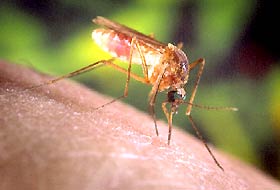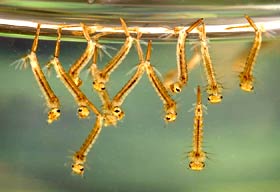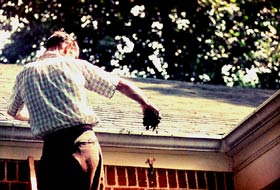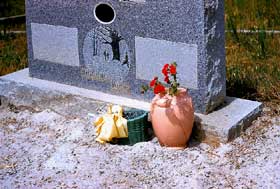
|
(alphabetized) |
Health
Second identification of West Nile virus in July in Galveston County mosquitoes and safety tips
The second pool of mosquitoes was from a League City site
By Marilyn Clark, League City Area News Online
August 7, 2004 La Marque, TEXAS -- According to officials with the Galveston County Health District, "West Nile virus has been identified in a second pool of mosquitoes. The most recent identification was found in north Galveston County in the League City area."
La Marque, TEXAS -- According to officials with the Galveston County Health District, "West Nile virus has been identified in a second pool of mosquitoes. The most recent identification was found in north Galveston County in the League City area."
Galveston County Health District Public Information Officer Kurt Kooperman said that in 2002 and again in 2003, one person came down with West Nile virus in Galveston County. Both individuals recovered fully. No Galveston County residents have come down with West Nile virus this year.
Koopmann says that while residents should not panic they should take preventive measures.
Applying DEET is very important. "DEET is an effective repellent that lasts much longer than other repellents." Follow the directions on the container when applying mosquito repellents with DEET on children.
 Koopmann says it is important to follow the four D's. This will reduce the likeihood of becoming infected with the West Nile virus:
Koopmann says it is important to follow the four D's. This will reduce the likeihood of becoming infected with the West Nile virus:
- "Dusk to Dawn - stay indoors from dusk to dawn when those mosquitoes likely to carry the infection are most active.
- Dress - dress in long pants and long sleeves when you are outside, especially in mosquito-infested areas .
- DEET - apply insect repellant that contains DEET. Read and follow label instructions. Spray both exposed skin and clothing with repellant.
Drain - get rid of standing water in your yard and neighborhood. Old tires, flowerpots, clogged rain gutters, leaky pipes and faucets, birdbaths and wading pools can be breeding sites for mosquitoes."

Flower pots or vases in cemeteries can also be breeding sites for mosquitoes.
Consider draining standing water twice a week.
The following questions and answers are from a couple of Frequently Asked Questions (FAQ) sheets on the West Nile Virus from The Texas Department of Health.
"Q. What are the Symptoms of West Nile Virus (WNV)?
 A. Most people infected with WNV will not show symptoms. Some, however, may have a fever, headache, body aches, and swollen lymlph nodes. A small number may develop encephalitis (inflammation of the spinal cord). Although rare, death can occur (1)."
A. Most people infected with WNV will not show symptoms. Some, however, may have a fever, headache, body aches, and swollen lymlph nodes. A small number may develop encephalitis (inflammation of the spinal cord). Although rare, death can occur (1)."
"Q. Where does the virus live? Do birds or mosquitoes get it first?
A. Birds get it first. The virus is in their bloodstream. Mosquitoes become infected when they feed on infected birds. The infected mosquitoes can then transmit West Nile virus to humans and animals while biting to take blood. The virus is located in their salivary glands and, during blood feeding, the virus can be injected into the animal or human, where it can multiply, possibly causing illness in the animal or human (2)."
"Q. What is the risk of someone becoming infected with West Nile?
A. The risk is very low. Even in areas where the virus is circulating, very few mosquitoes are infected with the virus. Even if the mosquito is infected, less than 1% of people who get bitten and become infected will get severely ill. The chances you will become severely ill from any one mosquito bite are extremely small (2)."
Kooperman said that people who are elderly (or over 50 yrs-old), who have certain types of cancers, or who have immune system deficiences or are on immunosuppressive drugs are more at risk than those who are young and in good health.
Kooperman also said that no dead birds have tested positive for West Nile virus in Galveston County this year. Galveston County tests blue jays, cardinals, and hawks who have died recently (the body has not yet become stiff) for West Nile virus. These birds are considered to be good indicators of the presence of West Nile virus in an area.
After a dead bird has tested positive in an area of the county such as League City, Galveston Island, or Bolivar Penisula, testing in that particular area will be discontinued.
The testing of dead birds will continue even though the Health District knows that West Nile virus is in the area due to the results of mosquito testing.
If you would like to collect a bird that is fresh (not stiff), Kooperman said that
- Residents should put a plastic bag on their hand.
- Pick up the dead bird.
- Put the bird and the bag on the hand in another plastic bag.
- Then, keep the bird cool with ice, in a cooler, or in a refrigerator.
Dead bird dropoff sites include
- Joe Vickery Animal Shelter, 3412 Loop 197 N., Texas City, (409) 938-2282
- GCHD Environmental Building, 1205 Oak Street, La Marque, (409) 938-2300
- GCHD Vital Statistics Office, Island Community Center, 4700 Broadway, Suite C100, Galveston, (409) 765-2515
- Justice of the Peace Court #9, Noble Carl Rd., Crystal Beach, Fridays 10 a.m. - Noon
- Galveston County Mosquito Control offices at 5115 Highway 3, in Dickinson, 800-842-5622
- If you can not deliver a fresh, dead bird to a collection site, call 938-2345 and make arrangements for pickup.
For More Information Contact: Kurt Koopmann
Public Information Officer
Galveston County Health District
(409) 938-2211
kkoopman@gchd.org
or visit the West Nile information link at: www.texaswestnile.org .
Sources: Galveston County Health District
Texas Department of Health
(1) http://www.tdh.state.tx.us/zoonosis/diseases/Arboviral/westNile/information/wnFact.asp
(2) http://www.tdh.state.tx.us/zoonosis/diseases/Arboviral/westNile/information/wnFaq.asp
Image Sources: Public Health Image Library at the Communicable Disease Center in Atlanta, GA.
"Culex quinquefasciatus mosquito on a human finger" image provided by CDC/William Brogdon.
"Culex larvae found collecting in standing water in an Atlanta, Georgia" image provided by CDC/James Gathany.
"Domestic mosquitoes can breed in gutter drains" image provided by CDC/Graham Heid, Dr. Harry D. Pratt.
"A flower container can act as a breeding place for domestic mosquitoes" image provided by CDC/Graham Heid and Dr. Harry D. Pratt.
Updated on August 11, 2004.
Good Nutrition for a Healthy Lifestyle
AARP Webster Chapter #199 will meet at 9:30 am on Friday, August 20th at the Bay Area Community Center, 5002 NASA Road Parkway across from the Clear Lake Park.
The program "Good Nutrition for a Healthy Lifestyle" will be presented by Lynn Maarous, UTMB Nutritionist.
Come on out and enjoy our entertaining and informative programs. Non-members are welcome.
Health: The Rose Helps Fight Breast Cancer and Osteoporosis July 27, 2004
© 2004-2006
League City Area News Online.
All rights reserved.
Marilyn Clark.
League City Area News Online, P. O. Box 1693, League City, Texas 77574-1693
Please include your address and phone number for verification purposes.